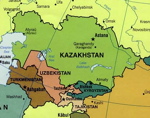On July 18, Assistant Secretary for South and Central Asian Affairs Richard Boucher met with representatives from South and Central Asian countries to discuss how the United States could promote economic integration in their region. The session was part of a dialogue conducted as part of the Third Annual Meeting of the U.S.-Central Asia Trade and Investment Framework Agreement (TIFA). The day before, the Office of the U.S. Trade Representative hosted the third annual TIFA Meeting. The United States and the five Central Asian countries signed the TIFA agreement in June 2004. The TIFA process focuses on identifying means to overcome impediments to intraregional trade, economic development, and foreign direct investment. The U.S.-Central Asian TIFA commits the parties to meet at least once a year in a "structured, ongoing forum." Representatives from the governments of Afghanistan, India, and Pakistan also typically participate. Under the Bush administration, the United States has undertaken a major effort to promote increased regional economic integration -- both among the Central Asian countries and, more innovatively, between them and the South Asian countries of Afghanistan, India, and Pakistan. The U.S. State Department has designated a Special Ambassador for Trade in Greater Central Asia as well as reorganized its geographic bureaus in order to place South and Central Asian issues within a single office.
U.S. Aims in Central and South Asia Challenged by Russia and China

